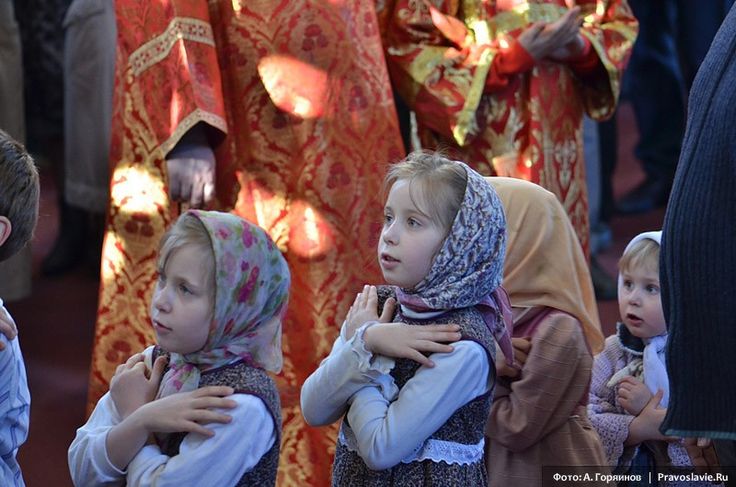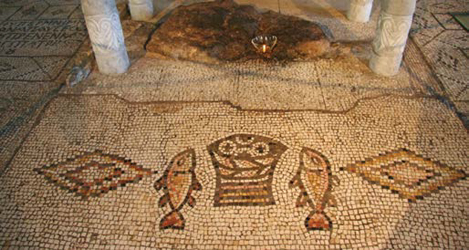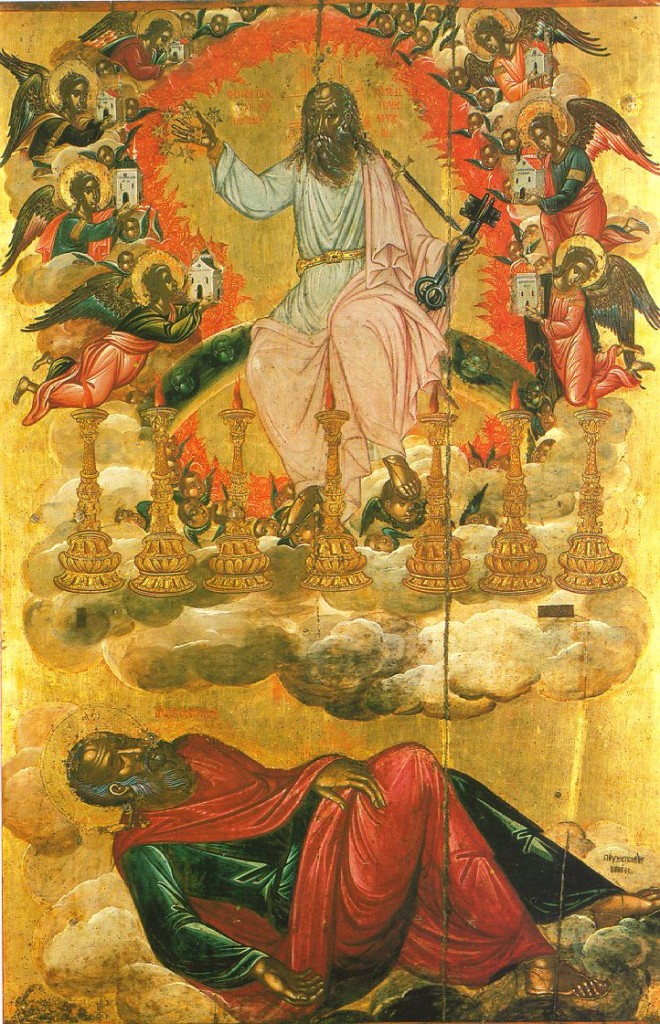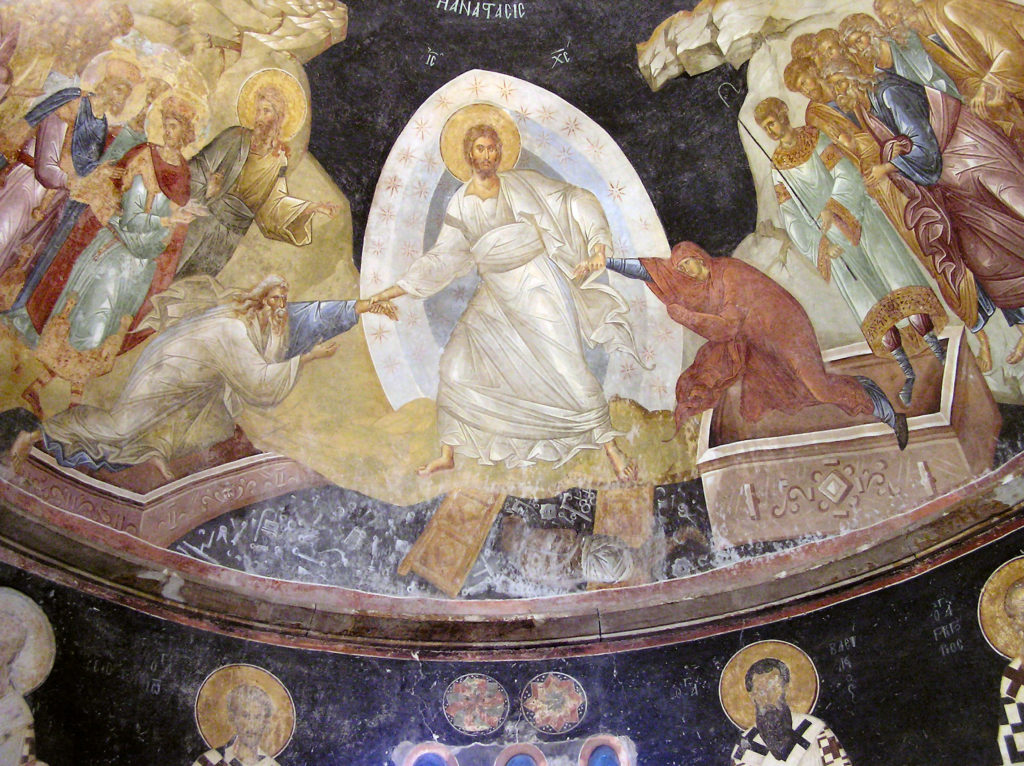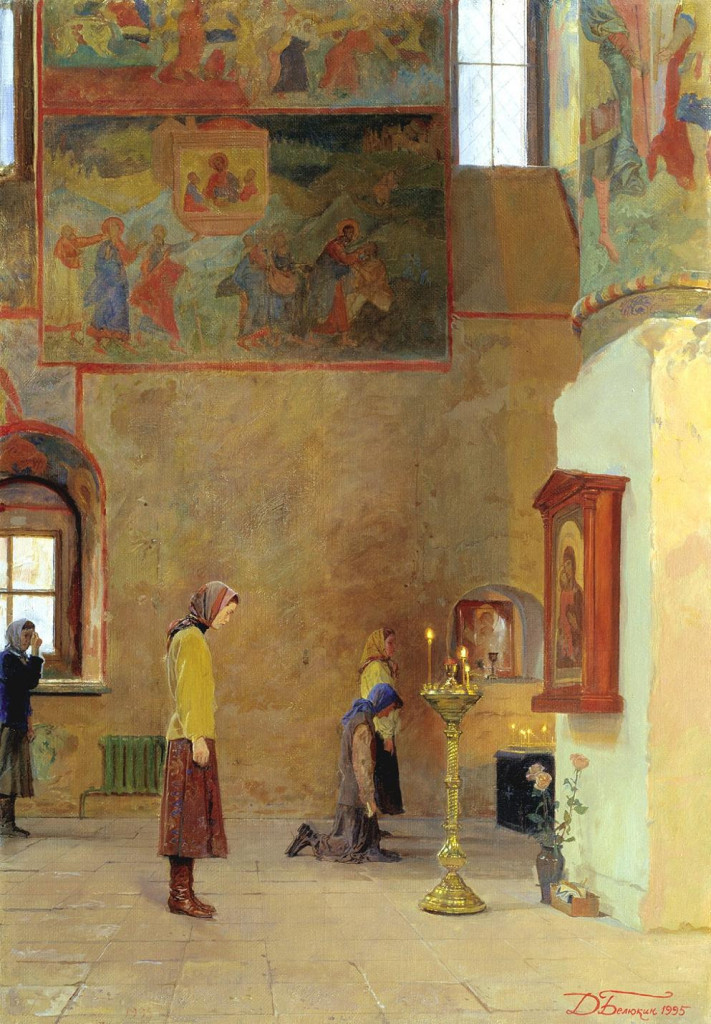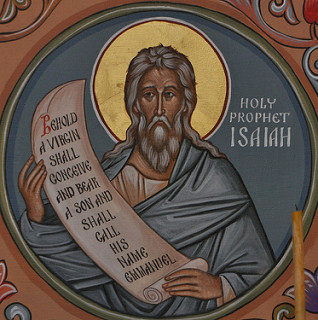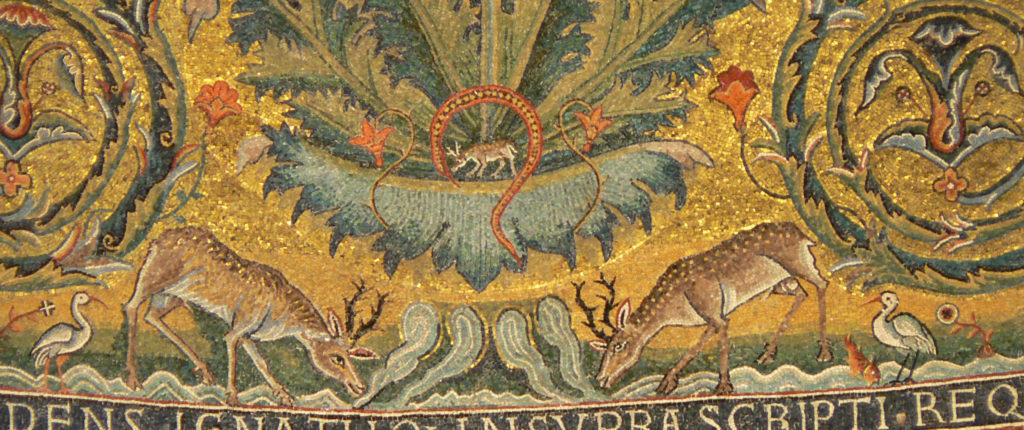III Pascha Friday – John 6: 48-54
Listen to an audio podcast of this post at https://www.spreaker.com/episode/pascha-iii-friday-his-flesh-and-blood–60160859
The Lord said to the Jews who believed on him: I am that bread of life. Your fathers did eat manna in the wilderness, and are dead. This is the bread which cometh down from heaven, that a man may eat thereof, and not die. I am the living bread which came down from heaven: if any man eat of this bread, he shall live for ever: and the bread that I will give is my flesh, which I will give for the life of the world. The Jews therefore strove among themselves, saying, How can this man give us his flesh to eat? Then Jesus said unto them, Verily, verily, I say unto you, Except ye eat the flesh of the Son of man, and drink his blood, ye have no life in you. Whoso eateth my flesh, and drinketh my blood, hath eternal life; and I will raise him up at the last day.
This great and exceeding promise of the Lord, that He would give us His own flesh and blood as food, and that our partaking of them would grant us eternal life, inspires the great Chrysostom to rise to the heights of eloquence in the well known passage reproduced below, remarkable even compared to the many other great patristic praises of the Holy Eucharist. It is so complete, and requires so little explanation, that I wanted only to write it and read it for you today; whatever I could have added would have been by way of an anticlimax.
“Those men at that time reaped no fruit from what was said, but we have enjoyed the benefit in the very realities. Wherefore it is necessary to understand the marvel of the Mysteries, what it is, why it was given, and what is the profit of the action. We become one Body, and members of His flesh and of His bones” (Ephesians 5: 30). Let the initiated follow what I say. In order then that we may become this not by love only, but in very deed, let us be blended into that flesh. This is effected by the food which He has freely given us, desiring to show the love which He has for us. On this account he has mixed up Himself with us; He has kneaded up His body with ours, that we might be a certain One Thing, like a body joined to a head. For this belongs to them who love strongly; this, for instance, Job implied, speaking of his servants, by whom he was beloved so exceedingly, that they desired to cleave unto his flesh. For they said, to show the strong love which they felt, ‘Who would give us to be satisfied with his flesh (Job 31:31) ?’ Wherefore this also Christ has done, to lead us to a closer friendship, and to show His love for us; He has given to those who desire Him not only to see Him but even to touch, and eat Him, and fix their teeth in His flesh, and to embrace Him, and satisfy all their love. Let us then return from that table like lions breathing fire, having become terrible to the devil; thinking on our Head, and on the love which He has shown for us. Parents often entrust their offspring to others to feed; ‘but I,’ says He, ‘do not so; I feed you with My own flesh, desiring that you all be nobly born, and holding forth to you good hopes for the future. For He who gives Himself to you here, much more will do so hereafter. I have willed to become your Brother, for your sake I shared in flesh and blood, and in turn I give out to you the flesh and blood by which I became your kinsman. ‘ This blood causes the image of our King to be fresh within us, produces beauty unspeakable, permits not the nobleness of our souls to waste away, watering it continually, and nourishing it. The blood derived from our food becomes not at once blood, but something else; while this does not so, but straightway waters our souls, and works in them some mighty power. This blood, if rightly taken, drives away devils, and keeps them afar off from us, while it calls to us Angels and the Lord of Angels. For wherever they see the Lord’s blood, devils flee, and Angels run together. This blood poured forth washed clean all the world; many wise sayings did the blessed Paul utter concerning it in the Epistle to the Hebrews. This blood cleansed the secret place, and the Holy of Holies. And if the type of it had such great power in the temple of Hebrews, and in the midst of Egypt, when smeared on the door-posts, much more the reality. This blood sanctified the golden altar; without it the high priest dared not enter into the secret place. This blood consecrated priests, this in types cleansed sins. But if it had such power in the types, if death so shuddered at the shadow, tell me how would it not have dreaded the very reality? This blood is the salvation of our souls, by this the soul is washed, by this is beautiful, by this is inflamed, this causes our understanding to be more bright than fire, and our soul more beaming than gold; this blood was poured forth, and made heaven accessible.
“Awful in truth are the Mysteries of the Church, awful in truth is the Altar. A fountain went up out of Paradise sending forth material rivers; from this table springs up a fountain which sends forth rivers spiritual. By the side of this fountain are planted not fruitless willows, but trees reaching even to heaven, bearing fruit ever timely and undecaying. If any be scorched with heat, let him come to the side of this fountain and cool his burning. For it quenches drought, and comforts all things that are burnt up, not by the sun, but by the fiery darts. For it has its beginning from above, and its source is there, whence also its water flows. Many are the streams of that fountain which the Comforter sends forth, and the Son is the Mediator, not holding mattock to clear the way, but opening our minds. This fountain is a fountain of light, spouting forth rays of truth. By it stand the Powers on high looking upon the beauty of its streams, because they more clearly perceive the power of the Things set forth, and the flashings unapproachable. For as, when gold is being molten, if one should (were it possible) dip in it his hand or his tongue, he would immediately render them golden; thus, but in much greater degree, does what here is set forth work upon the soul. Fiercer than fire the river boils up, yet burns not, but only baptizes that on which it lays hold. This blood was ever typified of old in the altars and sacrifices of righteous men. This is the price of the world, by this Christ purchased to Himself the Church, by this He has adorned Her all. For as a man buying servants gives gold for them, and again when he desires to deck them out does this also with gold; so Christ purchased us with His blood, and adorned us with His blood. They who share this blood stand with Angels and Archangels and the Powers that are above, clothed in Christ’s kingly robe, and having the armor of the Spirit. Nay, I have not yet said any great thing: they are clothed with the King Himself.
“Now as this is a great and wonderful thing, so if you approach it with pureness, you approach for salvation; but if with an evil conscience, for punishment and vengeance. ‘For he that eats and drinks unworthily’ of the Lord ‘eats and drinks judgment to himself (I Corinthians 11:29)’ ; since if they who defile the kingly purple are punished equally with those who rend it, it is not unreasonable that they who receive the Body with unclean thoughts should suffer the same punishment as those who rent it with nails. Observe at least how fearful a punishment Paul declares, when he says, ‘He that despised Moses’ law dies without mercy under two or three witnesses; of how much sorer punishment, suppose ye, shall he be thought worthy, who has trodden underfoot the Son of God, and has counted the blood of the covenant, wherewith he was sanctified, an unholy thing (Hebrews 1: 28) ?’ Take we then heed to ourselves, beloved, we who enjoy such blessings; and if we desire to utter any shameful word, or perceive ourselves hurried away by wrath or any like passion, let us consider of what things we have been deemed worthy, of how great a Spirit we have partaken, and this consideration shall be a sobering of our unreasonable passions. For how long shall we be nailed to present things? How long shall it be before we rouse ourselves? How long shall we neglect our own salvation? Let us bear in mind of what things Christ has deemed us worthy, let us give thanks, let us glorify Him, not by our faith alone, but also by our very works, that we may obtain the good things that are to come, through the grace and lovingkindness of our Lord Jesus Christ, by whom and with whom, to the Father and the Holy Ghost be glory, now and ever and world without end. Amen.”
– St. John Chrysostom, Homily 46 on John
